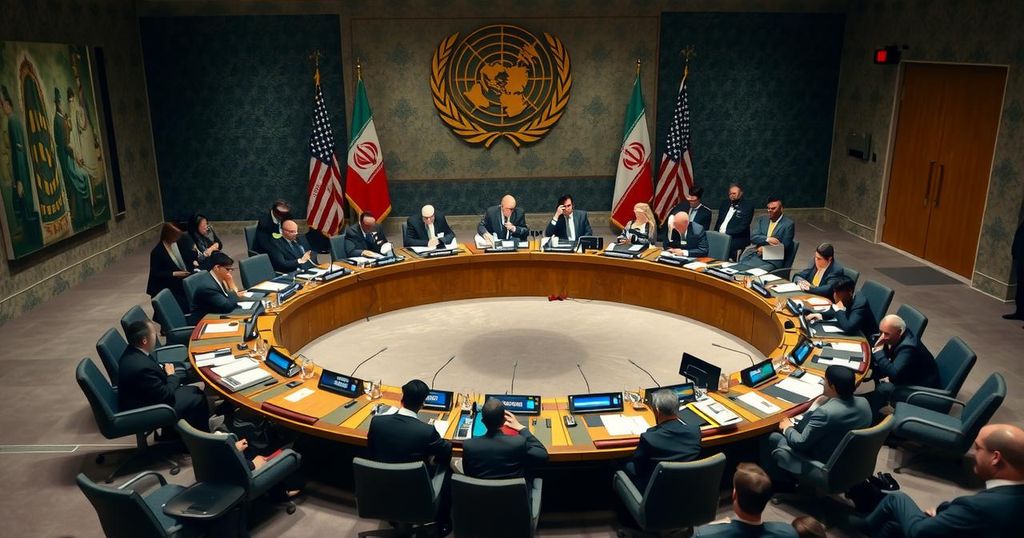The UN Security Council will meet to discuss Israel’s recent airstrikes on Iran, initiated after Iran launched missiles at Israel. This meeting follows requests from Iran, supported by several countries. Both sides are entrenched in escalating conflict, with discussions also revolving around proposals for humanitarian ceasefires and ongoing regional tensions involving groups like Hamas and Hezbollah.
The United Nations Security Council is convening an emergency meeting this Monday to address the escalating tensions in the Middle East following Israel’s airstrikes on Iranian targets. This meeting was prompted by a request from Iran, supported by Algeria, China, and Russia. According to Iran’s Foreign Minister, Abbas Araqchi, the actions of the Israeli government pose a significant threat to international peace and security, potentially further destabilizing an already volatile region. Israel’s recent strikes on Saturday involved multiple air raids aimed at Iranian missile facilities, a response coming weeks after Iran had launched approximately 200 ballistic missiles at Israel amid ongoing conflicts involving Iranian-affiliated groups Hamas and Hezbollah. Iran’s Supreme Leader, Ayatollah Ali Khamenei, urged balance in reaction to the Israeli strikes, emphasizing the need for perspective without calling for immediate retaliation. This incident marks the first openly acknowledged assault by Israel on Iran, as stated by Israeli Prime Minister Benjamin Netanyahu, who declared that the operations were successful in degrading Iran’s defensive capabilities and missile production. In addition, Iraq has filed a complaint to the United Nations regarding Israel’s use of its airspace during the attacks, highlighting the violation of Iraq’s sovereignty. Reports have surfaced of further Israeli airstrikes in southern Lebanon resulting in casualties as tensions continue to rise in the region. Egypt’s President, Abdel-Fattah el-Sissi, proposed a two-day ceasefire in the ongoing Israel-Hamas conflict, suggesting a temporary halt that would lead to discussions on hostages held by Hamas. El-Sissi’s proposal, which aims to supply humanitarian aid to the beleaguered Palestinian population, marks his first significant initiative after months of diplomatic efforts alongside the United States and Qatar. Simultaneously, the head of Israel’s Mossad has engaged in discussions with Qatari officials and the U.S. CIA director, amidst the continuing hostilities that began when Hamas launched an attack on Israel on October 7, 2023, resulting in a tragic loss of life and numerous hostages taken by militants. The ensuing Israeli military operations in Gaza estimate the death toll of Palestinians at nearly 43,000, according to local health authorities, who emphasize the need for a clearer distinction in casualty counts between combatants and civilians.
Recent developments in the Middle East have heightened tensions following a cycle of retaliatory actions between Israel and Iran. Israel’s airstrikes on Iranian missile production sites were in direct response to prior missile attacks launched by Iran. This exchange is emblematic of the broader conflicts involving militant groups such as Hamas and Hezbollah, connected to Iran. Moreover, geopolitical reactions from countries in the region and beyond underscore the gravity of these events. The United Nations Security Council’s intervention underscores the international community’s concerns regarding regional stability and security.
The emergency meeting of the UN Security Council reflects the serious implications of Israel’s military actions against Iran. With Iran characterizing these strikes as a significant threat and Iraq lodging diplomatic complaints, the potential for wider regional instability is pronounced. Egypt’s ceasefire proposal aims to alleviate immediate humanitarian crises while negotiations persist to ensure long-term peace. As the conflict escalates, the humanitarian toll continues to rise, emphasizing the urgent need for a diplomatic resolution to this volatile situation.
Original Source: www.voanews.com






